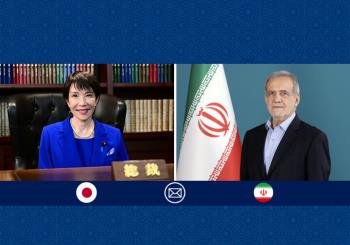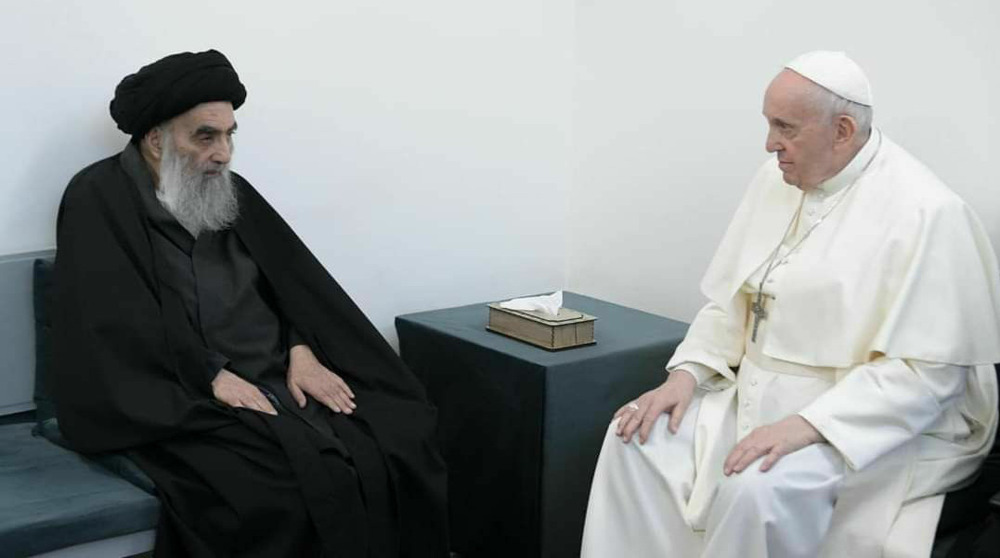Alwaght- Pope Francis met with Iraq’s prominent Shiite cleric Grand Ayatollah Ali al-Sistani on Saturday in the Muslim country's holy city of Najaf, delivering a message of peaceful coexistence.
The closed-door talks took place at Ayatollah Sistani’s residence and continued for 50 minutes.
The office of Ayatollah Sistani said in a statement that he highlighted challenges facing mankind and stressed the role of belief in God and commitment to high moral values in overcoming them.
Ayatollah Sistani cited injustice, oppression, poverty, religious persecution, repression of fundamental freedoms, wars, violence, economic siege and displacement of many people in the region, especially the Palestinians in the occupied territories as some of the major problems which afflict the world.
The cleric touched on the role of religious and spiritual leaders in tackl
Ayatollah Sistani said the religious leaders have to encourage the involved parties to conflicts, particularly the world powers, to prioritize rationality instead of confrontation.
The Shia cleric, the statement said, stressed the importance of efforts to strengthen peaceful coexistence and humanitarian solidarity in all societies based on mutual respect among the followers of different religions and intellectual factions.
Ayatollah Sistani emphasized that the Christian citizens, like all the Iraqis, should live in security and peace in full accordance with their fundamental rights.
He also referred to the role played by the religious authority in protecting the Christians and all those who suffered from the terrorists’ criminal acts over the past years.
After the one-hour meeting, Pope Francis travelled to the Iraqi city of Ur, which tradition holds as the birthplace of Prophet Abraham (PBUH), father of Judaism, Christianity and Islam.
The pontiff arrived in Iraq on Friday for a three day trip amid concerns about the coronavirus pandemic. In addition to Ayatollah Sistani, Pope Francis has so far met with Iraqi Prime Minister Mustafa al-Kadhimi and President Barham Salih.
Before the trip, the Vatican said the pope’ visit to Iraq will be socially distanced devoid of the usual fanfare and celebrations.
“No more than a few hundred people, distanced” would be gathered to see him to minimize the risks, said Vatican spokesman Matteo Bruni.
Additionally, Cardinal Louis Raphael I Sako, the patriarch of Iraq’s Chaldean Catholic church, said that when it comes to the large masses and Pope Francis’ diplomatic meetings, “There is no risk for him, and also for people,” since social distancing and mask-wearing measures would be observed.
Pope Francis also emphasized that even if the Iraqis only saw him on television it would mean something because “they will see that the pope is there in their country,” adding, “I am the pastor of people who are suffering.”
The Pope’s visit to Iraq has been his first international trip since the coronavirus pandemic swept the world and the first time a head of the Roman Catholic Church has visited the country.
Iraq’s Christian community has seen its numbers drop from nearly 1.5 million to about 250,000, less than 1% of the population over the last two decades.
Iraqi Christians fled the country to escape the chaos and violence that ensued after US-led invasion in 2003.
Tens of thousands were also displaced after the Daesh terrorist group overran northern swathes in Iraq in lightning attacks in 2014, launching a crackdown on the country’s minorities.
The Takfiri terrorist group was vanquished in December 2017 after a three-year anti-terror military campaign, which also had the support of neighboring Iran.
Daesh’s remnants, though, keep staging sporadic attacks across Iraq, attempting to regroup and unleash a new era of violence.
The terrorist group has intensified its deadly attacks in Iraq since January 2020, when the United States assassinated legendary anti-terror Iranian commander General Qassem Soleimani and his Iraqi trenchmate Abu Mahdi al-Muhandis near Baghdad International Airport.



























